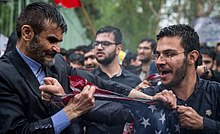
| Part of a series on |
| Conservatism in Iran |
|---|
  |
| Ideologies |
Principles
Principlist groups
Monarchist groups |
| History |
| Intellectuals |
PoliticiansPrinciplists
Monarchists |
Literature
|
PartiesActive
Defunct |
| Organisations |
| Media |
| Related topics |
Anti-American sentiment in Iran is not new; the chant "Death to America" has been in use in Iran since at least the Islamic revolution in 1979, along with other phrases often represented as anti-American. A 1953 coup which involved the CIA was cited as a grievance. State-sponsored murals characterised as anti-American dot the streets of Tehran. It has been suggested that under Ayatollah Khomeini anti-Americanism was little more than a way to distinguish between domestic supporters and detractors, and even the phrase "Great Satan" which has previously been associated with anti-Americanism, appears to now signify either the United States or the United Kingdom.
Some studies show that anti-Americanism in Iran is related to support for political Islam. US attempts to cripple Iran's economy have also significantly made Anti-American sentiment more common. Students from Tehran have been documented saying about US sanctions: “The more they push, the more it will lead to a rise in anti-Americanism.” and "It’s just a vicious circle."
See also
References
- Robert Tait, 'America wants Iran to be dependent on it and Iranians don't want that' Archived 2021-06-09 at the Wayback Machine, 2 February 2006, The Guardian.
- Philip Herbst (2003). Talking terrorism: a dictionary of the loaded language of political violence. Greenwood Publishing Group. p. 6. ISBN 978-0-313-32486-4.
- Tamim Ansary (2009) Destiny Disrupted: A History of the World Through Islamic Eyes: 334
- Michael Dumper; Bruce E. Stanley (2007). Cities of the Middle East and North Africa: a historical encyclopedia. ABC-CLIO. p. 351. ISBN 978-1-57607-919-5. Archived from the original on 2023-03-16. Retrieved 2016-10-10.
- Nathan Gonzalez (2007). Engaging Iran: the rise of a Middle East powerhouse and America's strategic choice. Greenwood Publishing Group. pp. ix. ISBN 978-0-275-99742-7.
- Sanger, David E.: "Bombs Away?", Upfront, The New York Times, 16
- Johnson, Boris (22 June 2009). "What has Ayatollah Khamenei of Iran got against little old Britain?". The Daily Telegraph. Londo. Archived from the original on 11 August 2018. Retrieved 3 April 2018.
- "World News » UK is Tehran's 'Great Satan'". Gulf Daily News. 25 June 2009. Archived from the original on 19 April 2015. Retrieved 11 May 2012.
- Asadzade, Peyman (2019). "Faith or Ideology? Religiosity, Political Islam, and Anti-Americanism in Iran". Global Security Studies. 4 (4): 545–559. doi:10.1093/jogss/ogy038. Archived from the original on 2020-07-26. Retrieved 2020-04-21.
- "Iran sanctions stoke anti-US sentiment". Archived from the original on 2022-11-02. Retrieved 2022-11-02.
- "US Economic Sanctions Harm Iranians' Right to Health". Archived from the original on 2021-12-21. Retrieved 2022-11-02.
| Anti-American sentiment | |
|---|---|
This Iran-related article is a stub. You can help Misplaced Pages by expanding it. |